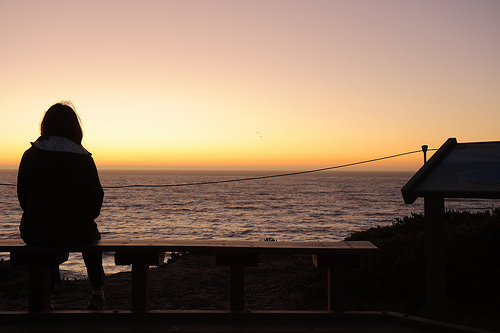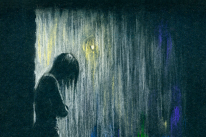
“He who doesn’t fear death only dies once.” ~Giovanni Falcone
“None of us get out of here alive…” My sweet friend spoke those words, a few months before she lost her battle with Stage IV Brain Cancer at the tender age of 33.
She had a sense of humor, always, and even in the midst of her intense radiation treatments, was able to make light of a fact that is so obviously true—yet is so inherently avoided by Western culture.
Standing by my friend during her battle with cancer was the very first time in my life that I experienced death up close and personal.
I had lost my grandfather as a teenager, but as an adult, his was the closest I’d come to death. The loss of any life is heartbreaking, though it seems that there is a form of closure that naturally occurs when you know that someone has had lived a long and fulfilling life.
When a young person dies it is tragic, this is the reality. We can slice and dice our ideas of the after life and paint whatever picture we choose, but the bottom line is, a life lost so young impacts many, and the grief stretches far.
As I watched her life slowly fade over time, I began to find myself experiencing restless nights, often thinking about how lonesome it must have felt being in her position. Upon her death, reality only set in further, and shook me to my core.
I started to ask myself: Why was this happening to her? Does death have to be a scary and lonely experience? Could I ever be fearless of death?
I would repeat these in my head in various forms, and the more I would ponder, the more that fear would rear its ugly head. It would present itself in many ways, mostly scenarios that could possibly happen in my own life—losing a child or losing my husband, for example.
These are scenarios that many of us live with on a daily basis, even without the trigger of the death of a loved one.
I watched my thoughts unfold and I realized that I needed to put a stop to the madness. If you’re reading this blog, your level of self-awareness is likely high enough to be able to do the same—to recognize when something is spiraling out of your control.
I set about to come up with a new plan of not just covering up the fear, but confronting it, and making peace with it.
Below you will find my top three suggestions to fight fear in the face of death. You can take these steps independent of each other, depending on where you are in your journey; however, combined, they may provide you with comfort and peace of mind.
Acknowledge your fears.
Set aside some time to really go into the dark place. Write a list of your deepest darkest fears, the ones that are on your mind all the time. Don’t repress; get it all out.
It will be scary, it could be dark, but it is necessary. You don’t even have to read them after—you can throw the paper out forever if you’d like—but getting them out is a crucial first step to dealing with them.
Once we identify our fears, we can begin to work on accepting them. Calling out what haunts you gives you power. Try this with something small to start.
The next time you feel any anxiety or fear, stop in your tracks and think for a moment about what’s causing that intense feeling. Next, identify it out loud if you can, or clearly in your head if you are in a public place.
Despite the irrationality of our minds, calling out the reason behind our fear is liberating. This is why writing out and acknowledging our deepest fears focusing on death, which to many of us is unknown territory, is such an important task.
The concept of acknowledgment as a first step stretches from Western psychological practice far beyond. I know of Energy Healers, therapists, and others with various belief systems that all agree that you must acknowledge first before you can move past fear.
Spend time alone.
Accepting your fears doesn’t happen overnight. It can, but oftentimes it takes time and practice.
When you first start addressing them, you may experience an increase in mental chatter. Our minds tend to fight us when we are close to overcoming challenges of any kind.
This can be further intensified when it pertains to the unknown, particularly subconsciously fearful concepts of death that Western Culture has placed on us over the years.
For this obstacle, I recommend time alone.
I’ve never been one to enjoy spending time alone, at least not for lengths of time. My husband on the other hand could go camping for days on his own happily.
But I believe that peace of mind comes with the ability to be content with oneself without distractions.
Can you imagine yourself taking a trip to a secluded space on your own with only your mind to accompany you? This idea has always has terrified me, which is precisely why it is so important.
If you can’t manage to sneak away for your own personal trip, I am certain you can make time for this: Ten minutes per day in a quiet setting. Similar to meditation, you can sit in quiet—and when you start to think, pull yourself back in to silence.
I either sit outside in nature, or if indoors, I often imagine a beautiful beach with a sunset before me. I try to hear only the waves crashing on the shore.
Once we can be alone with our minds, we can be more at peace and more prepared to face our fears.
This simple practice, though crucial to overcoming fear, is not exclusive to it. It will help you tremendously in taking control of your mind, and can even lead to other benefits such as feeling more compassion and kindness for others.
Rather than a step to follow, I recommend this practice in conjunction with step one if you are having difficulty with acknowledging your fears, and do not currently have a mindfulness practice in place.
Be grateful.
This seems so obvious, but we can get so caught up in the big things that we neglect to appreciate the small things. Many people keep journals, and make lists at the end of the day, but I find that too easy. I find I naturally think about my day in gratitude when it’s all over.
An important habit to create is to pause throughout the day and be grateful while you are in the midst of it.
Look up at the sky on your lunch break and notice the beauty of the clouds; watch your children as they play in the pool, more joyful than any adult could possibly be; and most obviously, stop and smell the roses.
We so easily become drawn into the future, especially when we experience the loss of a loved one. Thinking of our mortality is a surefire way to stir negative emotions within us. Still, we do not have to become slaves to it. We can instead choose to focus on what we have now.
It is okay if we slip; it’s nearly impossible to always live in the present moment in our world today. But if we continue to draw ourselves into a position of gratitude, we can overcome our fears more fully.
—
This year I have noticed patterns—new life is arriving in great quantities, and many lives are also tragically being lost. There may be no rhyme or reason to these events, but my friend had it right when she said, “None of us get out of here alive…”
We will all most certainly meet the same fate one way or another, so to avoid this is simply putting of the inevitable.
If we can face this, we can really live and enjoy more peace and joy than we ever could imagine.
Photo by John Loo
About Heidi Oran
Heidi Oran is the Founder of The Conscious Perspective, where she writes about personal growth, spirituality, and humanitarian causes. You can connect with Heidi on Facebook or Twitter.













 Though I run this site, it is not mine. It's ours. It's not about me. It's about us. Your stories and your wisdom are just as meaningful as mine.
Though I run this site, it is not mine. It's ours. It's not about me. It's about us. Your stories and your wisdom are just as meaningful as mine.
This was so beautifully written. I am constantly working to not allow my fears to prevent me from truly living and enjoying the time I have here. Your friend’s quote is so true, I never looked at it that way but she was right. As for being grateful I love the notion of being grateful in the midst of the moment and really how much sweeter is life when we come from a place of gratitide? Thank you for your words. May we continue to have the courage and the strength to face our fears.
An excellent and thoughtful post. Facing fears can be difficult particularly when
they are not acknowledged. Being alone can be difficult for some. Aloneness is the other side of All oneness and conscious connection with creation and Creator that is created with increased love and gratitude despite difficulties encountered in living this at times, demanding life in this realm of being. When we transcend this dimension of life we have the potential to be more alive to life than when we are in fear of our mortality which is an instinctive survival response. We also tend to fear the death of our small ego identity. Some learn to die to old conditioned ways that serve no useful purpose to be liberated from self limiting fears of existence and seeming non existence. It is sad and emotionally painful to experience the passing of loved ones as the veil of our existence hides their presence in another dimension of life and being.Intuitive unconditional love can transcend that which tends to make us feel separated from those we love existing in other dimensions of life. Our love connects us to them when we are able to transcend the grieving and feelings of deep sadness and sense of lost relationship and tangible closeness we miss so very much.
As this grieving process is endured and lived through, and acceptance prevails, our loved ones are able to come closer in connection to us and we are more able to feel their presence at quiet moments of being and communion with life.
Consciously I know of fear and its content. And, unconsciously more fears will be revealed eventually, unknowingly. Which we need these to complete-and be completed. Thank you for your post!
Conquering fears from the belief systems takes courage, Love, compassion toward these ‘thoughts’ of time. “Time in a Bottle” as were trained and educated in a bottle of conformities of who we should be or not to be. ( Similarity in form or character; agreement: I acted in conformity with my principles, values, belief systems). What a silly charade of characters playing in the psychological mind-scapes of inner & outer worlds of separations living and functioning under a disguise of masks – costumes. Haha…it’s outrageously insane-crazy!. And, we’ve believed in others to tell us how to act, dress, eat, playing these roles. And, not our true nature! What is our true nature? I would say; Intelligent, Pure, Awareness, Mindful perceive everything in TLC. Totally Loving Care. Yes, functioning is happening without taking anything personal. Life is Living you! Life as One Divinely Energy has created you as many mirrors. Or you could say: “God is dreaming-acting out One scenario appearing as many.” More definitions of Conformity: is a type of social influence involving a change in belief or
behavior in order to fit in with a group-Society. This change is in response to real (involving the physical presence of
others) or imagined (involving
the pressure of social norms /
expectations) group pressure. Now where does Birth-Death come from? Conformity! Namaste ♥
thank you.the point of power and peace is in the present moment and it is ALWAYS the preent moment.Peace,Light and love to all. :))
Thank you.
“Western” thought was long ago based on the Middle Eastern belief in one Lord Jesus Christ who swallowed up death in victory!
If u could overcome fear of death with this, the buddha would be astonished
In my experience, I have noticed that when I face my fears, I experience more joy. I use binaural beats on youtube. While I listen to them, I bring out what I fear and experience the fear. It feels like you experience a mini death. At the moment, it does not feel good, but later, you will experience more joy.